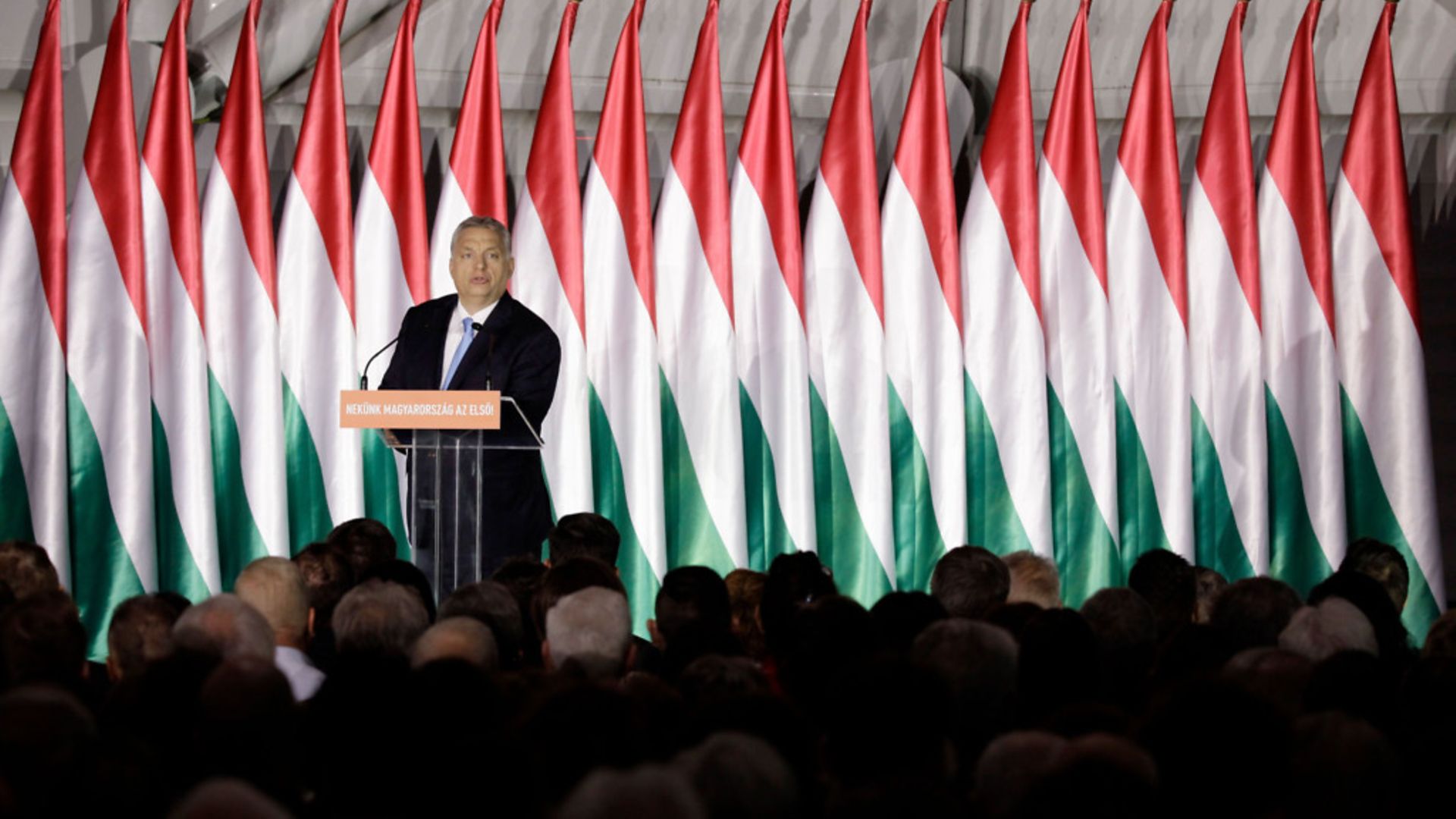
ZOE WILLIAMS draws parallels between Hungary’s increasing authoritarianism and the Brexit dream.
Last week, I went on Radio 4’s Today programme to defend George Eaton, deputy editor of the New Statesman, against Roger Scruton in the ongoing row about whether or not the former misquoted the latter, which has spiralled out into a larger question: is Roger Scruton a racist? Or are the people who call him that ‘manufacturing thought-crimes’ in order to silence conservatism in public life, as the philosopher has since claimed?
I don’t want to prosecute a vendetta against the man, and will not therefore be delving into the many statements he’s made this century which skirt the very farthest edges of what a conservative can say while staying the right side of what is and isn’t racist, as well as what is and isn’t truthful.
Instead, I wanted to concentrate on Hungary: A key element of the controversial New Statesman interview was Scruton’s claim that Hungary had been ‘invaded’ by ‘tribes’ of Muslims, and that the billionaire philanthropist George Soros indubitably had an ’empire’ there.
To defend Victor Orbán is de rigeur on the British extreme right: Nigel Farage made a nauseating speech to the European parliament last September, when it attempted to censure Orbán under Article Seven for the violation of fundamental rights. We will come back shortly to what those violations are.
Farage praised Orbán for standing up for his ‘nation’ and his ‘culture’, slated George Soros for pouring ‘$15 billion all over the world to break down nation states’, praised Orbán again for standing up to Soros, then hit the quite peculiar climax: ‘Come and join the Brexit club, you’ll love it.’
Hungary has become both muster point and fig leaf for certain key Brexit ideas, which still cause controversy when said outright (though Brexiters are more and more comfortable doing so): First, the recasting of immigration, specifically of the refugee crisis, as a threat to nation states from a dehumanised ‘flood’ or ‘swarm’ who are too fundamentally different ever to co-exist with Europeans, and arrive with the precise intention of overcoming us; secondly, the framing of Soros as a grand puppet-master, bent on undermining democracies with his vast wealth, which has come up in a UK context with his funding of pro-Remain groups such as Best For Britain and Another Europe is Possible.
There is no question that Soros has contributed to campaigns battling Brexit. His agenda is clear: Brexit is a far-right project, and he seeks to shore up and empower the progressive voices who oppose it.
It is a now-familiar sleight of hand, by the right, to portray any opposition to Brexit as anti-democratic, and undermining to national sovereignty; but there is also, whether from the mouth of Nick Timothy in the Telegraph, Victor Orbán on the election trail or the Trump supporters vowing to expose ‘all the heads of the George Soros Hydra’, a strong foundation of plainly anti-Semitic tropes, ascribing to the philanthropist puppet-master super-powers and nefarious secrecy which are simply untrue.
As Cyprus once was to Russian drug money, so Hungary is to the grubby promulgation of Islamophobia and anti-Semitism: a laundering device. Bigotry which would be hard to introduce on its own terms is instead funnelled through support for Hungary and its domestic politics. It strikes me, then, as important to nail down exactly what Hungary does represent, what those policies are, and what it therefore means when our politicians and public intellectuals defend and applaud it.
‘A very, very dark, far-right, totalitarian state,’ I called it on the radio. I should have said ‘project’, since ‘state’ suggests Orbán is at the end of a journey which is only a decade old, and still ongoing. It was quite literal and straightforward: Orbán has waged war against a free press since the media act of 2011, and most independent outlets have been taken over by his party, Fidesz.
The constitution of 2012 makes human rights contingent upon unclear requirements interpreted by judges who are chosen for their loyalty to the president. By 2018, electoral rules had been rewritten to ensure that only one party could win.
Meanwhile, systematic deceit about the threat of immigration – which, by 2018, was minuscule, under 1,000 asylum applications – has enabled a refugee internment policy that denies human rights as basic as food.
Now, plainly, these violations are quite targeted – asylum seekers and the homeless are in the eye of Orbán’s storm, and ordinary Hungarians do not live in fear of being rounded up, although unexpected deaths – an opposition candidate hit by a car, the owner of source code for software administering EU funds having a sudden and well-timed heart attack – would make any prominent dissenter think twice.
It is a fact that opposition is being suppressed and the ruling party’s powers steadily beefed up. You could certainly argue that it’s not totalitarian yet, and you could argue that it was merely headed towards less democracy, rather than none.
You could argue that it wasn’t as bad as Hitler or Stalin, so to borrow that vocabulary was excessive; though I’d counter that, since Hungary remains – that EU censure notwithstanding – part of the community which was established to promote peace and uphold universal human rights, the danger of understating Hungary’s transgressions is far greater, for all of us, than that of overstating them.
However, the pushback was far less discursive: the Europe editor of the Telegraph found my criticisms ‘risible’; ‘lazy’, ‘simplistic’, ‘self-defeating’, ‘silly’… right-wing think tanks weighed in to recommend that I take a ‘politics 101’, plainly not understanding any of its most basic words.
Meanwhile, on the Soros question, an extraordinary email arrived with me via the Guardian’s editor – it would be unfair to credit it, since it was private correspondence, but a person you’d expect to be relatively familiar with logical progression hit this crescendo (I’m afraid I must quote it in full):
‘A few years ago I knew a graduate student in London who campaigned for Roma rights, spoke about Roma rights, and her work included spending time in Hungary. I don’t remember unfortunately what the details were of her criticism of how George Soros’s projects in aid of Roma in Hungary were failing, but it was certainly not because George Soros was Jewish! I… would be interested in somebody talking about what Soros’s work has been in Hungary, what criticisms there have been. Not an unenlightening rant from your good self.’
An absolutely bizarre intervention: ‘I heard something once that I can’t remember, but it definitely wasn’t anti-Semitism!’
I raise all this, not out of personal chagrin, but because it has become a very key principle of right wing thought; Victor Orbán must be defended; his regime must remain on the right side of our minimum standards for democracy and human rights.
For, if Hungary and its rhetoric were to slip out of what is acceptable, what is sayable, in modern discourse, who nows what the contagion might be? Who and what else might become unacceptable? Nigel Farage himself? The Brexit dream?
While that is understandable, the unlovely facts on the ground are these: Hungary is not meeting those standards. Orbán is routinely demonising the other, in portraits ranging from the marauding Muslim to the fatcat Jew that are chillingly recognisable from the darkest points of this continent’s history.
The wonderful LSE professor Mary Kaldor, who taught Victor Orbán (ironically, putting him forward for a Soros scholarship to Oxford in 1989), said ‘you know you’re getting old when your students become dictators’.
It is quite plain where this is headed, and the danger of not naming it is profound.
Warning: Illegal string offset 'link_id' in /mnt/storage/stage/www/wp-includes/bookmark.php on line 357
Notice: Trying to get property 'link_id' of non-object in /mnt/storage/stage/www/wp-includes/bookmark.php on line 37







